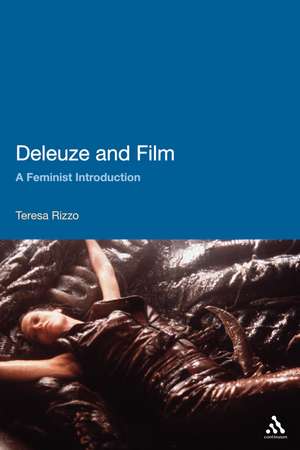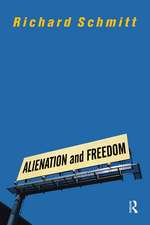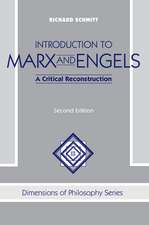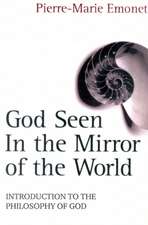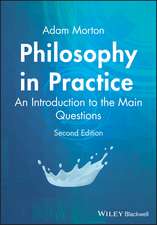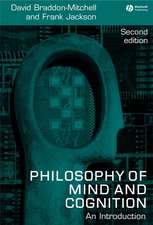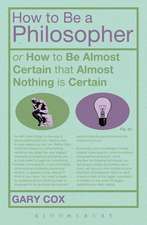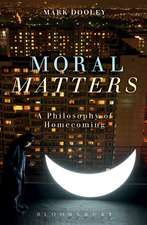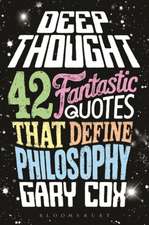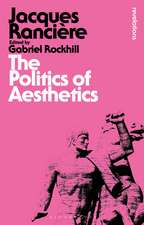Deleuze and Film: A Feminist Introduction
Autor Dr Teresa Rizzoen Limba Engleză Paperback – 25 apr 2012
Preț: 237.28 lei
Nou
Puncte Express: 356
Preț estimativ în valută:
45.40€ • 47.54$ • 37.66£
45.40€ • 47.54$ • 37.66£
Carte tipărită la comandă
Livrare economică 10-24 aprilie
Preluare comenzi: 021 569.72.76
Specificații
ISBN-13: 9781441113405
ISBN-10: 1441113401
Pagini: 208
Dimensiuni: 156 x 234 x 13 mm
Greutate: 0.34 kg
Ediția:New.
Editura: Bloomsbury Publishing
Colecția Continuum
Locul publicării:London, United Kingdom
ISBN-10: 1441113401
Pagini: 208
Dimensiuni: 156 x 234 x 13 mm
Greutate: 0.34 kg
Ediția:New.
Editura: Bloomsbury Publishing
Colecția Continuum
Locul publicării:London, United Kingdom
Caracteristici
Provides a vital and accessible introduction to recent feminist approaches to Deleuze and Guattari.
Notă biografică
Teresa Rizzo is currently lecturerin film studies at the University of New South Wales,where shealso gained her PhD. She has previously taught as Lecturer in Screen Studies atthe Australian Film, Television and Radio School.
Cuprins
Acknowledgements \ Introduction \ 1. The Cinematic Apparatus and theTranscendental Subject \ 2. Re-thinking Representation: New Lines of Thought inFeminist Philosophy \ 3. Cinematic Assemblages: An Ethological Approach to Film-viewing\ 4. The Slasher Film: A Deleuzian Feminist Analysis \ 5. The Alien Series: Alien-Becomings,Human-Becomings \ 6. The Molecular Poetics of the Assemblage: Before Night Falls \ Conclusion: A FeministCinematic Assemblage \ Notes \ Bibliography \ Index
Recenzii
A highly readable feminist introduction to Deleuze's Cinema volumes by foregrounding the bodily and affective nature of the cinematic viewing experience ... Rizzo's book is undoubtedly a valuable contribution to both Deleuze and feminist film studies
[An] accessible and interesting book ... [Deleuze and Film] provides a compelling method for identifying films that challenge static gender categories. As such, the book will doubtless be a useful tool for feminist researchers wanting to pursue questions of spectatorship
'Both an accessible introduction to Deleuze's cinema philosophy and a major advance in feminist film theory, this is a tour de force of lucid and creative thought. Rizzo's focus on the body of the viewer provides a provocative reconfiguration of Deleuze's cinematic taxonomy while opening lines of inquiry beyond the psychoanalytic models and theories of spectatorship currently dominant in film theory. An essential contribution to the field.'
'In Deleuze and Film: A Feminist IntroductionTeresa Rizzo presents us with a 'third Deleuze', that is a Deleuze who is a cineaste and a feminist. In this way we are given not only a new and rich introduction to Deleuze's thinking and writing on film, but also a provocative rethinking of his work from the perspectives of gender and film-making. This is an important intervention into the growing body of work on the intersection between Deleuze and cinema.'
[An] accessible and interesting book ... [Deleuze and Film] provides a compelling method for identifying films that challenge static gender categories. As such, the book will doubtless be a useful tool for feminist researchers wanting to pursue questions of spectatorship
'Both an accessible introduction to Deleuze's cinema philosophy and a major advance in feminist film theory, this is a tour de force of lucid and creative thought. Rizzo's focus on the body of the viewer provides a provocative reconfiguration of Deleuze's cinematic taxonomy while opening lines of inquiry beyond the psychoanalytic models and theories of spectatorship currently dominant in film theory. An essential contribution to the field.'
'In Deleuze and Film: A Feminist IntroductionTeresa Rizzo presents us with a 'third Deleuze', that is a Deleuze who is a cineaste and a feminist. In this way we are given not only a new and rich introduction to Deleuze's thinking and writing on film, but also a provocative rethinking of his work from the perspectives of gender and film-making. This is an important intervention into the growing body of work on the intersection between Deleuze and cinema.'
